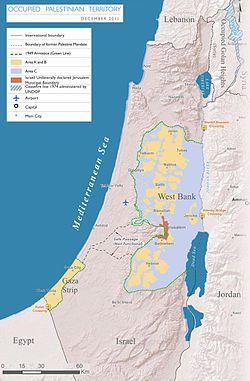Palestinian territories and occupied Palestinian territories (OPT or oPt) are terms often used to describe the West Bank (including East Jerusalem) and the Gaza Strip, which are occupied or otherwise under the control of Israel.[7][8][9] Israeli governments have maintained that the area involved is within territorial dispute.[10][11] The extent of the territories, while subject to future negotiations, have frequently been defined by the Green Line.
The term "Palestinian Territory, Occupied" was used by the United Nations (UN) and other international organizations between 1998 to 2013 in order to refer to areas controlled by the Palestinian National Authority. In December 2012, UN Secretariat communications replaced this by the term State of Palestine.[12] The ISO adopted the name change in 2013.[13] But, as of August 2015, the UN Security Councilcontinues to treat Palestine as a non-sovereign entity;[14] this prevents its admission to UN General Assembly membership.[15]
 Israel occupied the territories of the West Bank and Gaza Strip in the Six-Day War of 1967 and has since maintained control. Previously, these territories had been ruled by Jordan and Egypt, respectively, since the 1948 founding of Israel. In 1980, Israel officially absorbed East Jerusalem and has proclaimed the whole of Jerusalem to be its capital. The inclusion, though never formally amounting to legal annexation, was condemned internationally[16] and declared "null and void" by the United Nations Security Council.[17][18] The Palestinian National Authority, the United Nations,[19] the international legal and humanitarian bodies[20][21] and the international community [22][23] regard East Jerusalem as part of the West Bank, and consequently a part of the Palestinian territories. The Palestinian National Authority never exercised sovereignty over the area, although it housed its offices in Orient House and several other buildings as an assertion of its sovereign interests.[24][25]
Israel occupied the territories of the West Bank and Gaza Strip in the Six-Day War of 1967 and has since maintained control. Previously, these territories had been ruled by Jordan and Egypt, respectively, since the 1948 founding of Israel. In 1980, Israel officially absorbed East Jerusalem and has proclaimed the whole of Jerusalem to be its capital. The inclusion, though never formally amounting to legal annexation, was condemned internationally[16] and declared "null and void" by the United Nations Security Council.[17][18] The Palestinian National Authority, the United Nations,[19] the international legal and humanitarian bodies[20][21] and the international community [22][23] regard East Jerusalem as part of the West Bank, and consequently a part of the Palestinian territories. The Palestinian National Authority never exercised sovereignty over the area, although it housed its offices in Orient House and several other buildings as an assertion of its sovereign interests.[24][25]
Israel shut them down in response to the Sbarro restaurant suicide bombing.[26] Israeli sovereignty, however, has not been recognized by any country, since the unilateral annexation of territory occupied during war contravenes the Fourth Geneva Convention.[27][28] The cost of the occupation for Israel over four decades (1967–2007) is estimated to amount to $50 billion.[29] The World Bank estimates the annual cost in 2013 to the Palestinian economy of Israeli occupation at $3.4 billion.[30]
In 1988, with the Palestine Liberation Organization (PLO) intention to declare a Palestinian State, Jordan renounced all territorial claims to the West Bank, including East Jerusalem.[31] Since the Palestinian Declaration of Independence in 1988, 135 UN Member Nations have recognized the State of Palestine, comprising the Palestinian territories. It has not been recognized by Israel and some Western nations, including the United States.
In 1993, following the Oslo Accords, parts of the territories politically came under the jurisdiction of the Palestinian National Authority (Areas A and B). Israel still exercises full military control and, civil control over 61% of the West Bank (Area C). The Oslo Accords established access to the sea for Gaza within 20 nautical miles from the shore. The Berlin Commitment of 2002 reduced this to 12 miles (19 km). In October 2006 Israel imposed a 6-mile limit, and at the conclusion of the Gaza War restricted access to a 3-nautical-mile limit, beyond which a no-go zone exists. As a result, more than 3,000 Palestinian fishermen are denied access to 85% of the maritime areas agreed to in 1995.[32] The majority of the Dead Sea area is off-limits to Palestinian use, and Palestinians are denied access to its coast line.[33]
Israel disengaged from the Gaza Strip in 2005, however the international community considers the West Bank and the Gaza Strip still to be occupied by Israel.[9] The Hamas takeover of Gaza in 2007 divided the Palestinian territories politically. Abbas's Fatah largely ruled the West Bank and was recognized internationally as the official Palestinian Authority (see: Fatah-Hamas conflict).[34] In 2014, the two political groups agreed to hold elections and form a compromise unity government.[35] The 2014 Israel-Gaza conflict intervened; however, the unity government survived.[36]
No comments:
Post a Comment